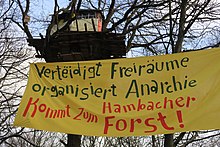
Back الصراع البيئي Arabic পাৰিপাৰ্শ্বিক সংঘাত Assamese Kompliktong pankapalibutan BCL পরিবেশগত সংঘাত Bengali/Bangla Gwrthdaro amgylcheddol Welsh Umweltkonflikt German Conflicto ambiental Spanish Ingurumen gatazka Basque درگیری زیستمحیطی Persian Conflits environnementaux French
| Part of a series on |
| Environmental justice |
|---|
|
|

Environmental conflicts, socio-environmental conflict or ecological distribution conflicts (EDCs) are social conflicts caused by environmental degradation or by unequal distribution of environmental resources.[1][2][3] The Environmental Justice Atlas documented 3,100 environmental conflicts worldwide as of April 2020 and emphasised that many more conflicts remained undocumented.[1]
Parties involved in these conflicts include locally affected communities, states, companies and investors, and social or environmental movements;[4][5] typically environmental defenders are protecting their homelands from resource extraction or hazardous waste disposal.[1] Resource extraction and hazardous waste activities often create resource scarcities (such as by overfishing or deforestation), pollute the environment, and degrade the living space for humans and nature, resulting in conflict.[6] A particular case of environmental conflicts are forestry conflicts, or forest conflicts which "are broadly viewed as struggles of varying intensity between interest groups, over values and issues related to forest policy and the use of forest resources".[7] In the last decades, a growing number of these have been identified globally.[8]
Frequently environmental conflicts focus on environmental justice issues, the rights of indigenous people, the rights of peasants, or threats to communities whose livelihoods are dependent on the ocean.[1] Outcomes of local conflicts are increasingly influenced by trans-national environmental justice networks that comprise the global environmental justice movement.[1][9]
Environmental conflict can complicate response to natural disaster or exacerbate existing conflicts – especially in the context of geopolitical disputes or where communities have been displaced to create environmental migrants.[10][3][6] The study of these conflicts is related to the fields of ecological economics, political ecology, and environmental justice.
- ^ a b c d e Scheidel, Arnim; Del Bene, Daniela; Liu, Juan; Navas, Grettel; Mingorría, Sara; Demaria, Federico; Avila, Sofía; Roy, Brototi; Ertör, Irmak; Temper, Leah; Martínez-Alier, Joan (2020-07-01). "Environmental conflicts and defenders: A global overview". Global Environmental Change. 63: 102104. Bibcode:2020GEC....6302104S. doi:10.1016/j.gloenvcha.2020.102104. ISSN 0959-3780. PMC 7418451. PMID 32801483.
- ^ Lee, James R. (2019-06-12). "What is a field and why does it grow? Is there a field of environmental conflict?". Environmental Conflict and Cooperation. Routledge. pp. 69–75. doi:10.4324/9781351139243-9. ISBN 978-1-351-13924-3. S2CID 198051009.
- ^ a b Libiszewski, Stephan (1991). "What is an Environmental Conflict?" (PDF). Journal of Peace Research. 28 (4): 407–422.
- ^ Cardoso, Andrea (December 2015). "Behind the life cycle of coal: Socio-environmental liabilities of coal mining in Cesar, Colombia". Ecological Economics. 120: 71–82. Bibcode:2015EcoEc.120...71C. doi:10.1016/j.ecolecon.2015.10.004.
- ^ Orta-Martínez, Martí; Finer, Matt (December 2010). "Oil frontiers and indigenous resistance in the Peruvian Amazon". Ecological Economics. 70 (2): 207–218. Bibcode:2010EcoEc..70..207O. doi:10.1016/j.ecolecon.2010.04.022.
- ^ a b Mason, Simon; Spillman, Kurt R (2009-11-17). "Environmental Conflicts and Regional Conflict Management". WELFARE ECONOMICS AND SUSTAINABLE DEVELOPMENT – Volume II. EOLSS Publications. ISBN 978-1-84826-010-8.
- ^ Hellström, Eeva (2001). Conflict cultures: qualitative comparative analysis of environmental conflicts in forestry. Helsinki, Finland: Finnish Society of Forest Science [and] Finnish Forest Research Institute. ISBN 951-40-1777-3. OCLC 47207066.
- ^ Mola-Yudego, Blas; Gritten, David (October 2010). "Determining forest conflict hotspots according to academic and environmental groups". Forest Policy and Economics. 12 (8): 575–580. Bibcode:2010ForPE..12..575M. doi:10.1016/j.forpol.2010.07.004.
- ^ Martinez Alier, Joan; Temper, Leah; Del Bene, Daniela; Scheidel, Arnim (2016). "Is there a global environmental justice movement?". Journal of Peasant Studies. 43 (3): 731–755. doi:10.1080/03066150.2016.1141198. S2CID 156535916.
- ^ "Environment, Conflict and Peacebuilding". International Institute for Sustainable Development. Retrieved 2022-02-18.